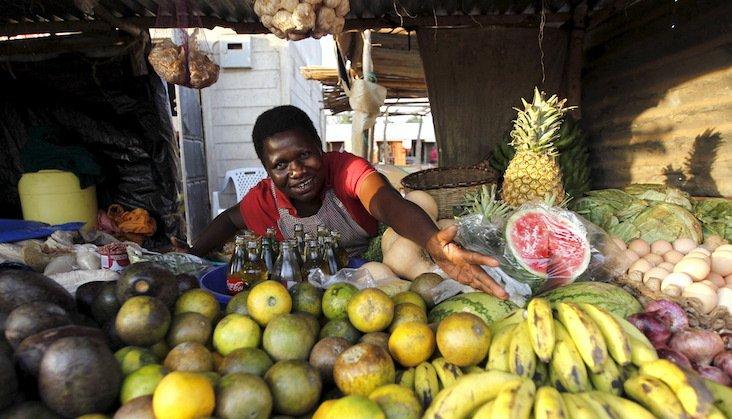Africa-Press – Mauritius. While epidemiologists are concerned about the rapid spread of coronavirus, economists are worried about the pandemic’s already visible and potential economic damage. Global stock markets have reacted nervously.
The Organization for Economic Cooperation and Development (OECD) provides a scenario for 2020 in which economic growth outside China falls by less than in China itself, and that the world economy is reduced by about half a percentage point relative to previous forecasts.
Under OECD’s worst-case scenario, global growth could be cut in half, to 1.5% in 2020. There are also serious concerns that further spread of COVID-19 could jeopardize food security.
Other pandemics, including SARS, the avian influenza and MERS, led to food price hikes and market panics in affected areas. Fortunately, thus far, we have not seen major signs that COVID-19 is causing food shortages or price hikes.
Not even in China, where – as a recent IFPRI blog post pointed out – some stress has been reported in poultry and pork supply chains, but food supplies overall have remained adequate.
Prices for staple crops (like wheat, maize, and rice) have remained rather stable since the outbreak and, during February, world market prices for wheat and maize prices even showed slight declines.
While the price of rice was slightly up by 1%, none of the observed fluctuations seem related to the coronavirus outbreak. The virus associated with COVID-19 appears to have originated with animals (possibly pangolins, according to one source).
SARS and MERS are also animal coronaviruses that have spread to humans. However, unlike SARS, MERS, or the avian flu, COVID-19 has not spread through the livestock sector, thus not directly impacting the livelihoods of farmers or causing immediate food shortages.
Because of higher population densities and hence greater risk of person-to-person transmission, it is primarily urban economic activity that is directly affected by social-distancing efforts to contain the spread of COVID-19.
Food distribution channels could face some problems from transport disruptions and quarantine measures but impact on staple commodities are less frequent and shorter in duration than for higher valued food items.
That’s because such bulk commodities can be loaded, shipped and discharged with minimum human-to-human interaction. Also, global reserves of non-perishable grains such as wheat and rice should be sufficient to meet any surge in demand.
Hence, no major disruptions in production of staple foods have occurred and – for now – the risks of these occurring because of the coronavirus outbreak are minimal. Other parts of the food system may be more vulnerable, however.
For instance, businesses in the United States and elsewhere supplying high-value food products, like lobster and other crustaceans, to restaurants in China, have already been crippled by the coronavirus.
Supply chains for fruit and vegetables, which are highly dependent on seasonal and migrant labourers are also coming under pressure. The direct economic impact from coronavirus-related morbidity and mortality is likely to be muted in relation to some earlier pandemics, such as the 1918 Spanish Flu.
So far, COVID-19 has mainly caused very serious health challenges for and high death rates among older people with health vulnerabilities, many of whom are not in the work force. One important source of economic loss is the inability of COVID-19 patients with jobs to work fully effectively for at least several weeks.
Other direct economic impacts are felt through travel restrictions, quarantine requirements, and closures of schools and other gathering places designed to slow the spread of the virus. For now, most employers in affected countries are not yet massively laying off workers and consumers are generally still spending.
For a full-fledged recession to emerge, economic activity would need to slow more seriously across all areas and sectors—going beyond the specific areas affected now (quarantined cities, tourism, sports and other events, restaurants and activities involving people gathering in close proximity, and international passenger travel).
With the wider spread of the virus, a global recession is becoming a serious risk, as containment measures become more generalized across many countries and larger numbers of workers are prevented from doing their jobs.
We estimate that for every 1% global economic downturn of 1%, poverty would increase between 1.9% and 3%, affecting between 14 and 22 million people, especially in Africa.
Such a scenario would obviously pose a serious risk to the security of many. In short, we do not believe that at this stage, the new coronavirus will impact directly the supply of staple foods. But, while there is no need for panic regarding imminent risks to food security, there is no reason for complacency either.
Some countries, like the United States, have already taken monetary measures in the form of lower interest rates to counteract a possible slowdown, this is unlikely to be the most effective response given the nature of the risks.
To stave off a global recession and minimize a further rise in food insecurity, governments will need to provide fiscal stimulus, including resources to contain the spread of the disease and ensure adequate health care is available, as well as additional social protection to compensate workers and families affected by the containment measures.
For More News And Analysis About Mauritius Follow Africa-Press







